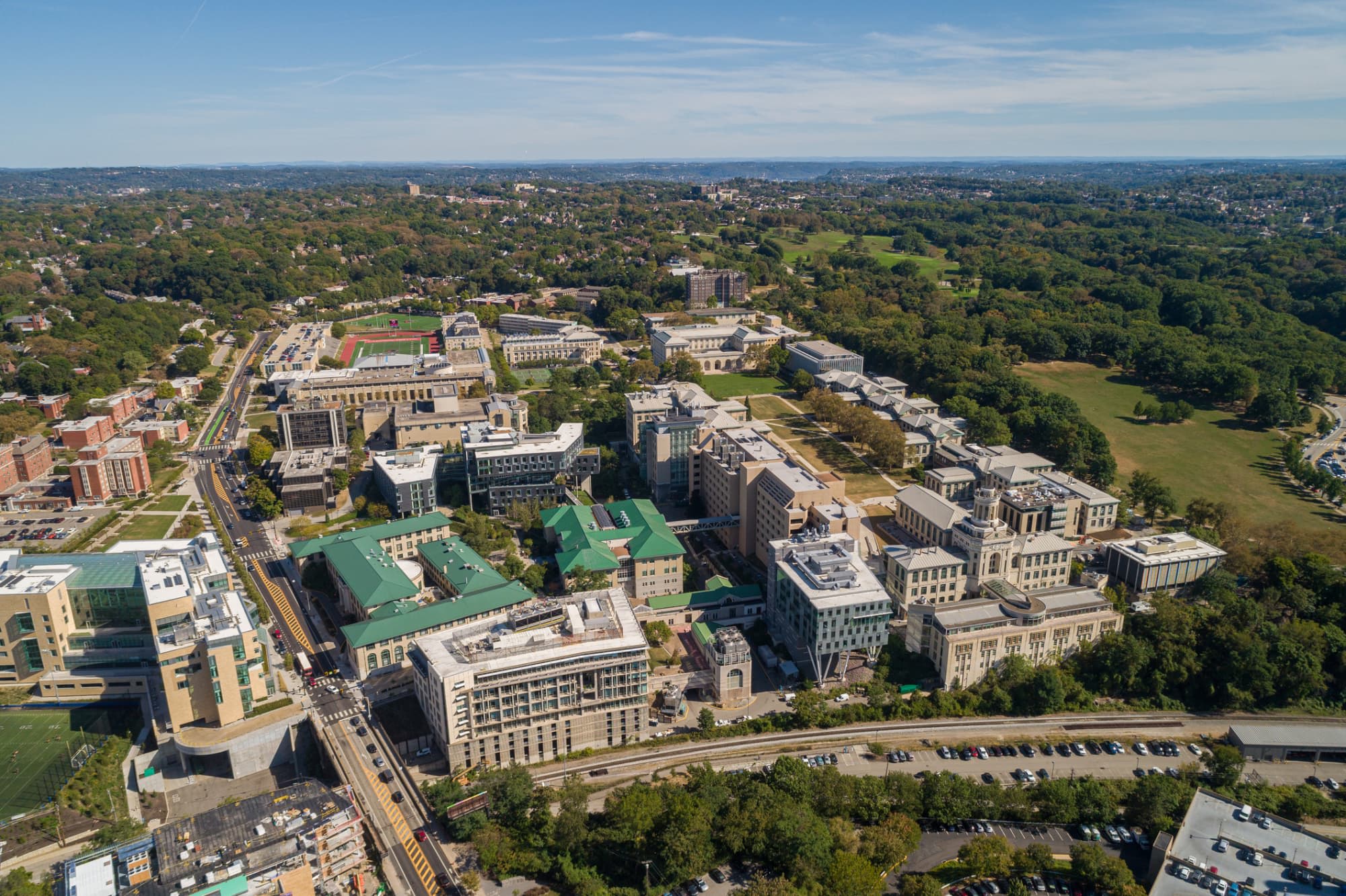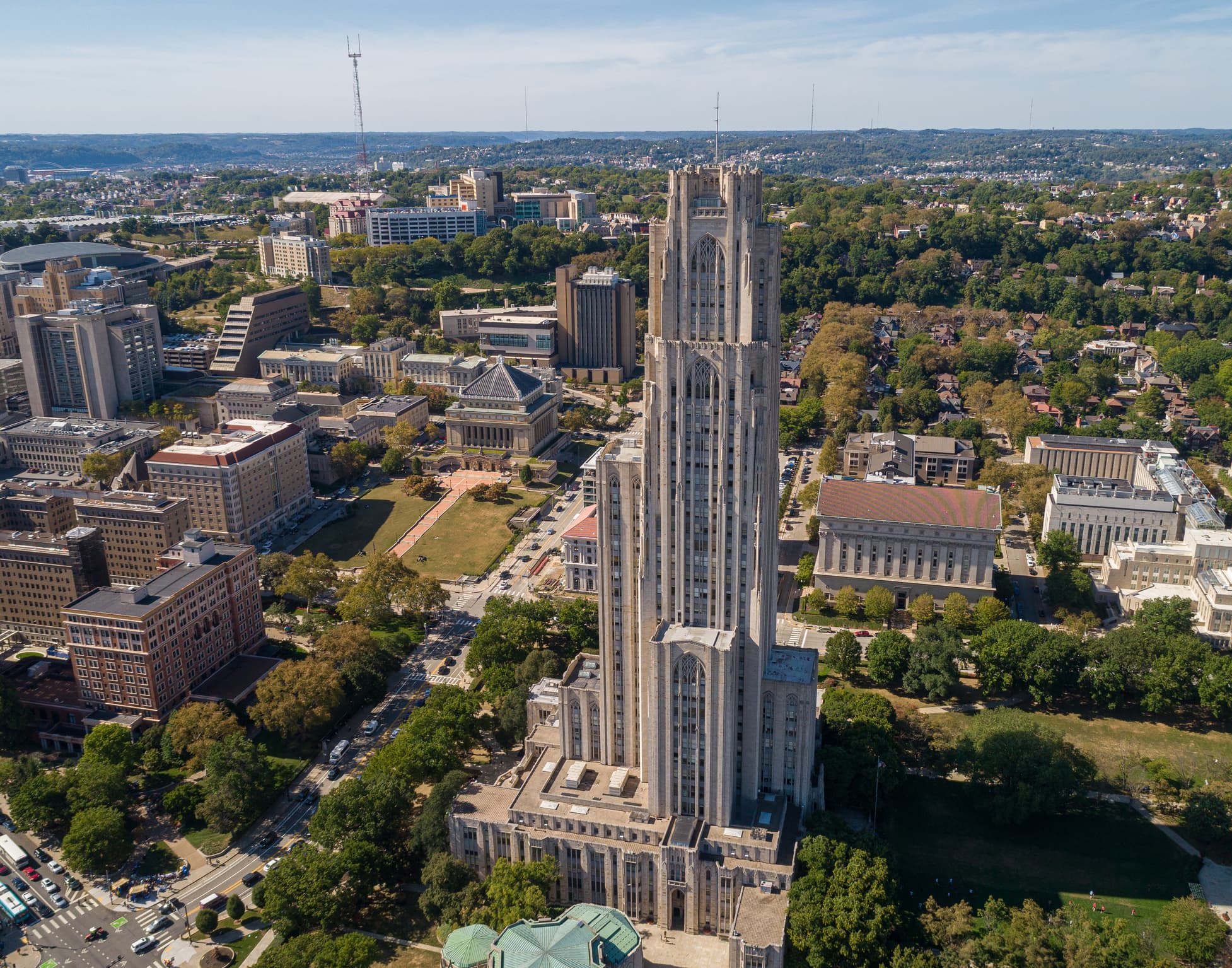Colleges in Pittsburgh: Full List of Schools
Writer
Editor & Writer
Writer
Editor & Writer
www.bestcolleges.com is an advertising-supported site. Featured or trusted partner programs and all school search, finder, or match results are for schools that compensate us. This compensation does not influence our school rankings, resource guides, or other editorially-independent information published on this site.
Turn Your Dreams Into Reality
Take our quiz and we'll do the homework for you! Compare your school matches and apply to your top choice today.
Did you know that Pittsburgh is where Dr. Jonas Salk created the polio vaccine? Today, Pittsburgh is a significant hub of technology and home to some of the most prestigious schools in Pennsylvania.
Carnegie Mellon University and the University of Pittsburgh are two of the most well-known colleges in Pittsburgh. If you're considering pursuing a post-secondary education in the "City of Bridges," you'll likely be immersed in a diverse and vibrant community.
3 Popular Colleges in Pittsburgh
We narrowed down the top-rated schools in Pittsburgh. The methods we use to rank private and public schools consider such factors as acceptance and graduation rates, academic rigor, and overall reputation.

1. Carnegie Mellon University
- Avg. Annual Net Price: $33,499
- Acceptance Rate: 11%
- Total Student Enrollment: 16,002
Originally established as Carnegie Tech, Carnegie Mellon University is a mid-sized private school that offers 134 bachelor's degrees. This school's graduation rate is 93%, and the student-faculty ratio is just 5:1. Also, about 96% of full-time first-year students return to continue their studies.
Carnegie Mellon University has been the academic home of 20 Nobel Laureates. Alums and faculty of this institution have received other prestigious awards in performing arts, medicine, science, engineering, and public administration.

2. University of Pittsburgh
- Avg. Annual Net Price: $24,286
- Acceptance Rate: 49%
- Total Student Enrollment: 33,767
With a graduation rate of 84%, the University of Pittsburgh, or Pitt, offers 96 bachelor's degree programs. This school has a student-faculty ratio of 14-to-1, and about 23% of students are enrolled online.
Prospective students looking for a campus with a safe and inclusive environment may find the University of Pittsburgh attractive. For example, Pitt has a reputation for being supportive of LGBTQIA+ attendees. This school has some notable alumni, including three who have competed at the Indianapolis Motor Speedway.
3. Duquesne University
- Avg. Annual Net Price: $33,919
- Acceptance Rate: 87%
- Total Student Enrollment: 8,107
With an enrollment of less than 6,000, Duquesne University may appeal to you if you thrive in smaller academic settings. The school's 77% acceptance rate also makes a college education relatively accessible for many aspiring students.
Duquesne University offers over 85 career-focused undergraduate programs. If you have work or other qualified life experience, you might be able to earn college credit toward your degree. Also, the university has one of the top-ranked MBA programs in the country, making for a viable transition into graduate school.
Featured Online Programs
List of All Colleges in Pittsburgh
We've created a complete list of all four-year nonprofit universities in Pittsburgh and the surrounding area. You can use the table below to compare data on student population, average net cost, acceptance rate, and number of applicants.
The following school data comes from the National Center for Education Statistics (NCES). All data is from 2022. Schools with fewer than 500 undergraduates were not included in this list.
| School | Total Student Enrollment | Avg. Annual Net Price | Acceptance Rate | Number of Applicants |
|---|---|---|---|---|
| Carlow University | 2,104 | $17,437 | 93% | 1,124 |
| Carnegie Mellon University | 16,002 | $33,499 | 11% | 34,261 |
| Chatham University | 2,387 | $28,322 | 66% | 3,514 |
| Duquesne University | 8,107 | $33,919 | 87% | 12,376 |
| La Roche University | 2,068 | $24,233 | 97% | 3,222 |
| Point Park University | 3,288 | $24,702 | 82% | 6,033 |
| Robert Morris University | 3,431 | $23,572 | 94% | 4,684 |
| Seton Hill University | 1,988 | $24,576 | 78% | 2,558 |
| University of Pittsburgh | 33,767 | $24,286 | 49% | 53,072 |
| University of Pittsburgh-Greensburg | 1,328 | $18,194 | 98% | 3,003 |
| Washington & Jefferson College | 1,151 | $25,636 | 88% | 3,414 |
5 Highest-Paying Jobs in Pittsburgh
You don't always need a graduate degree to qualify for high-paying roles. In fact, you can make well over six-figure salaries with just a bachelor's degree. Check out the highest-paying jobs in Pittsburgh below.
The following data is based on a May 2022 report from the Bureau of Labor Statistics.
- Chief Executive Officers (Mean Annual Salary: $216,790): Chief executive officers (CEOs) typically provide direction and vision for their organizations. They oversee operations at the highest level and usually answer to a board of directors or governors.
- Personal Financial Advisors (Mean Annual Salary: $184,770): This professional helps individuals and families make optimal decisions regarding insurance, investments, estate planning, taxes, and other financial matters. Most financial advisors receive on-the-job training and acquire state-level licensure or certification.
- Financial Managers (Mean Annual Salary: $153,340): Most financial managers maintain the fiscal well-being of the organizations they work for. They help develop a company's financial goals, create financial reports, and oversee organizational investment activities.
- Architectural and Engineering Managers (Mean Annual Salary: $151,500): This manager typically oversees the planning and implementation of designs, budgeting, and other activities related to architectural or engineering projects. Managers working in scientific research, large corporations, and manufacturing tend to earn more than the annual mean salary in this field.
- Computer and Information Systems Managers (Mean Annual Salary: $151,350): A manager in computer and information systems has typically acquired several years of experience in their field. They plan and manage all computer and information technology activities in their organization. Managers working in information, finance, and manufacturing tend to earn higher salaries.
Why Study in Pittsburgh?
- Pittsburgh is a major hub for many technological and innovation-driven industries. You have access to internships in cutting-edge sectors like healthcare, robotics, and artificial intelligence.
- Some of the nation's most prestigious universities are located in Pittsburgh. Institutions like Carnegie Mellon University and the University of Pittsburgh attract students from all over the U.S. and around the world.
- The city of Pittsburgh has a lively cultural and arts scene, with several musical venues, museums, and galleries to visit.
- Pittsburgh is a culturally diverse city, and the communities that make up this metropolitan area offer rich experiences off campus.
- You don't have to venture out of town to pursue employment opportunities. The local job market continues to grow, especially in healthcare, education, and technology.
Frequently Asked Questions About Colleges in Pittsburgh
How many colleges are in Pittsburgh?
There are 11 nonprofit universities and colleges in Pittsburgh you can choose from. Some of the most notable institutions include the University of Pittsburgh, Duquesne University, and Carnegie Mellon University.
Is it expensive to go to college in Pittsburgh?
Whether a college or university is expensive depends on the viewpoint of the applicant. That said, the cost of attending school in Pittsburgh varies, and private colleges and universities are more expensive than public schools. To compare, the average yearly net price to go to Carnegie Mellon University is over $33,000, whereas Carlow University costs less than $18,000 per year.
What is the hardest college to get into Pittsburgh?
Carnegie Mellon University accepts only about 11% of applicants, typically the lowest acceptance rate in Pittsburgh. Among first-year students who enroll, 96% continue their second year, and about 93% make it to graduation.







